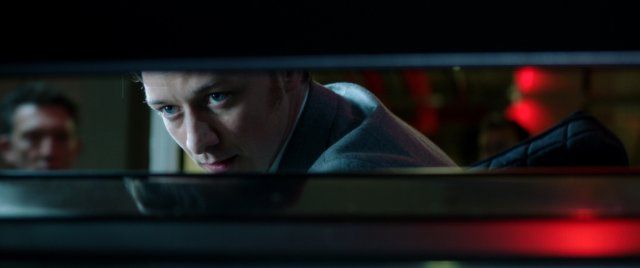Trance (2013) 

Director: Danny Boyle
Cast: James McAvoy, Rosario Dawson, Vincent Cassel
Synopsis: An art auctioneer who has become mixed up with a group of criminals partners with a hypnotherapist in order to recover a lost painting.
Danny Boyle isn’t the most prolific of movie directors — he makes on average one film every couple of years — so it’s reasonable to assume he takes his time selecting a suitable project, one he feels possesses an inherent quality of ideas from which he can carve a superior piece of work. He also has the pressure of his back catalogue to contend with. When you’ve got Trainspotting (1996) and Slumdog Millionaire (2008) on your cv, the fear of coming up with another A Life Less Ordinary (1997) or Millions (2004) must be overwhelming at times. So you choose, with care, a project you feel is worthy of, and which can be enhanced by, your skill as a filmmaker. And you can see why Trance might appeal to him; it’s an involved and clever story that requires a steady hand to guide an audience through its complexities — and to gloss over its flaws. There’s no denying Boyle does a job which many directors would be incapable of pulling off, but unfortunately he doesn’t quite pull it off. You can see what he and screenwriters Joe Ahearne and John Hodge were trying to do, but you ultimately come away from the movie with a profound sense of disappointment.
Trance is narrated by Simon Newton (James McAvoy), an assistant auctioneer who makes a name for himself when he unsuccessfully attempts to foil the robbery of a £27 million painting from his auction house employer. The heist is planned and led by the charismatic Franck (Vincent Cassel), who doesn’t react well when Simon manages to zap him with a taser, and smashes the have-a-go hero in the head with the butt of his weapon. But, as with almost every aspect of Trance, nothing is as it seems. When Franck and his gang reach safety, they open the case containing the priceless work of art to discover that the painting has been removed from its frame.
From his hospital bed, Simon enjoys life as a minor celebrity thanks to his attempts to foil the heist, despite suffering from amnesia. But he returns home to discover that his flat has been trashed, and we learn that Simon was actually the inside man, collaborating with the gang — and naturally they are more than a little peeved that he stiffed them, and that he now claims he can’t remember what he’s done with the painting. When torture and interrogation fail to extract the information from Simon, Franck decides to try a hypnotist in the hope that they might be able to unlock Simon’s memory, and presents him with a website containing the credentials and photos of a list of hypnotherapists. Simon chooses Dr. Elizabeth Lamb (Rosario Dawson) and, under the pretence of wanting to find a set of lost car keys, pays her a visit. However, while her new patient is in a light trance, Elizabeth notices a wire protruding from Simon’s shirt and realises that someone is listening in on their session.
The next time they meet, Elizabeth plays a pre-recorded tape of her voice and silently questions Simon about his real reasons for consulting her. Since their first meeting she has conducted research and discovered the story of his clash with the art thieves. Once she understands what is going on, she speaks directly into the tiny mic taped to Simon’s chest and tells Franck that she wants a meeting. During this meeting she negotiates a full partnership with the gang in return for her help in locating the painting.
Elizabeth’s induction into the gang provides only the starting point to an increasingly convoluted story filled with twists and turns and outlandish reveals that somehow never feel quite as ridiculous as they should, but which demonstrate the extraordinary lengths to which the writers have to go to prevent the story from breaking down completely. As it is, the plot gets pretty messy around the halfway mark as Boyle is at times forced to resort to alternating between up to three different conversations taking place at different points in time in order to keep things on track (and even then, on first viewing, this is probably only entirely clear to the writers). The suspicion of the revelation of a scam awaiting us at the conclusion of this maze-like storytelling is never far away, and it’s fairly obvious from the flicker of recognition on Elizabeth’s face during her first meeting with Simon that what we’re dealing with here is a highly unreliable narrator.
The idea that provides the core of Trance is to provide us with three characters who, as events unfold, undergo complete transformations in our eyes so that — although there are no good guys in the picture — we are forced to re-interpret everything we have seen in the light of the movie’s final revelation. Chances are, you’ll still be too busy trying to keep up on first viewing to decide whether that reveal is sublime or ridiculous, or somewhere between. For my money, the storyline is too complicated for Trance to be considered a complete success. There’s nothing wrong with movies that make you think, but not when the degree of thought required is down to deficiencies in the clarity and quality of the writing. In order for all the strands of Trance to pull together Ahearne and Hodge have to engineer some pretty big coincidences and inconsistencies in the behaviour of major characters, and there’s a certain laziness in apparently minor but crucial details which, while not exactly qualifying as holes in the plot, nevertheless leave us questioning its dependability.
httpv://www.youtube.com/watch?v=L4_bdS3_gr0
